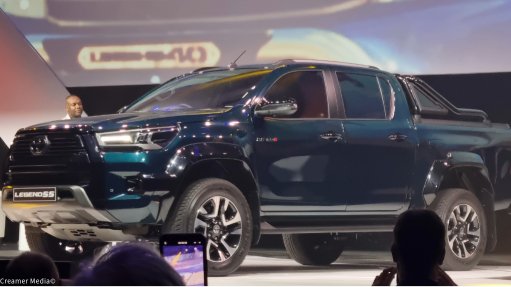Gibela’s passenger train – a ride into the future
Train manufacturer Gibela offers South African rail users state-of-the-art commuter trains that focus on a safer, greener and more comfortable ride, says Gibela project executive Adrian Geekie.
Gibela is committed to producing 600 trains for the Passenger Rail Agency of South Africa (Prasa) by 2030, as well as providing train maintenance, technical support and the manufacture and supply of spare parts through to 2035.
“Attracting South African commuters to rail is vital in light of the climate change promises the country has made ahead of November’s United Nations COP26 climate change talks in Glasgow, Scotland. If South Africa can convince investors it is planning for radical change, it stands to secure some of the almost $83-billion in international funding available for green investments,” he notes.
Passenger rail enables countries and cities to dramatically reduce greenhouse-gas (GHG) emissions, and Gibela is central to the South African government’s commitment to moving away from its dependence on coal for energy. South Africa is reported by Bloomberg Green to be the world’s twelfth-biggest source of GHGs.
Gibela’s passenger train is specifically designed to meet South African conditions, to match the most used rail gauge in the country, and to attract consumers, with its focus on comfort and safety, says Geekie.
“Gibela trains are designed collaboratively by an international design team and South African engineers, ensuring that commuters have the smoothest, safest ride, while travelling in a modern, ‘green’ train that has several energy-saving features,” he says.
The trains are made from stainless steel and are 30% lighter than those made of carbon steel. A lighter train consumes less energy, resulting in fewer GHG emissions. Further, South Africa has stainless steel manufacturing capabilities, whereas using aluminium would have required that components be imported.
Geekie says the Gibela passenger train uses an electrical braking system that feeds energy back into the electrical supply system, which can be used by other trains that are close by and on the network, reducing energy consumption by a further 30%. Instead of dissipating kinetic energy through friction braking to slow the train, the trains are slowed electromechanically, generating electrical energy in the process of slowing the train.
“The electrical energy generated in this way is fed back into the power supply system, providing electrical energy to other trains on the network. Not only does this system result in lower electricity consumption, but it also reduces wear and tear on the components in the braking system,” he explains.
“If, for any reason, the train is not able to feed electricity back into the supply system, the generated energy is dissipated in brake resistors mounted on the roof of the train. Thus, the mechanical wear and tear benefits are gained even if full electrical energy recovery is not possible.”
The trains have been specially designed with safety features top of mind, says Gibela project manager Devendran Govender.
The open gangways allow freedom of movement through the train and a closed-circuit television network means that passengers’ safety can be monitored in real time. Air conditioning ensures the compartments remain comfortable in any season, while careful layout allows for maximum occupancy during peak periods. The trains also have additional doors to match anticipated passenger flows, while large windows provide a light and airy environment, creating a healthier and more enjoyable commuter experience.
All the non-metallic parts of the train are made with sophisticated fire-resistant materials that comply with International Railway Fire Safety Specifications which dictate, among others, flammability, how much smoke is produced and toxicity to humans if a train does catch alight, notes Govender.
The trains are also equipped with modern fire and smoke detectors that are linked to an interface panel, enabling train drivers to see where smoke or flames have been detected, allowing them to take the necessary action. The system also includes emergency push buttons that allow passengers to trigger an alarm and alert the driver to any safety issues.
A real-time passenger information system keeps commuters informed of safety issues through LED screens and audio systems, Govender says.
Further, in the unlikely event of an accident or collision, the train has been designed to minimise injury to passengers and staff by allowing for the energy of the collision to be absorbed, while protecting passengers and maintaining the integrity of the passenger compartment. The design also features an “anti-crash” system, where “for example, an onboard signalling system automatically intervenes if the driver exceeds the authorised speed limit, or passes a red signal,” explains Geekie.
The anti-crash system will, however, only be fully functional when certain aspects of Prasa’s trackside infrastructure are upgraded, he notes.
Article Enquiry
Email Article
Save Article
Feedback
To advertise email advertising@creamermedia.co.za or click here
Comments
Press Office
Announcements
What's On
Subscribe to improve your user experience...
Option 1 (equivalent of R125 a month):
Receive a weekly copy of Creamer Media's Engineering News & Mining Weekly magazine
(print copy for those in South Africa and e-magazine for those outside of South Africa)
Receive daily email newsletters
Access to full search results
Access archive of magazine back copies
Access to Projects in Progress
Access to ONE Research Report of your choice in PDF format
Option 2 (equivalent of R375 a month):
All benefits from Option 1
PLUS
Access to Creamer Media's Research Channel Africa for ALL Research Reports, in PDF format, on various industrial and mining sectors
including Electricity; Water; Energy Transition; Hydrogen; Roads, Rail and Ports; Coal; Gold; Platinum; Battery Metals; etc.
Already a subscriber?
Forgotten your password?
Receive weekly copy of Creamer Media's Engineering News & Mining Weekly magazine (print copy for those in South Africa and e-magazine for those outside of South Africa)
➕
Recieve daily email newsletters
➕
Access to full search results
➕
Access archive of magazine back copies
➕
Access to Projects in Progress
➕
Access to ONE Research Report of your choice in PDF format
RESEARCH CHANNEL AFRICA
R4500 (equivalent of R375 a month)
SUBSCRIBEAll benefits from Option 1
➕
Access to Creamer Media's Research Channel Africa for ALL Research Reports on various industrial and mining sectors, in PDF format, including on:
Electricity
➕
Water
➕
Energy Transition
➕
Hydrogen
➕
Roads, Rail and Ports
➕
Coal
➕
Gold
➕
Platinum
➕
Battery Metals
➕
etc.
Receive all benefits from Option 1 or Option 2 delivered to numerous people at your company
➕
Multiple User names and Passwords for simultaneous log-ins
➕
Intranet integration access to all in your organisation


















